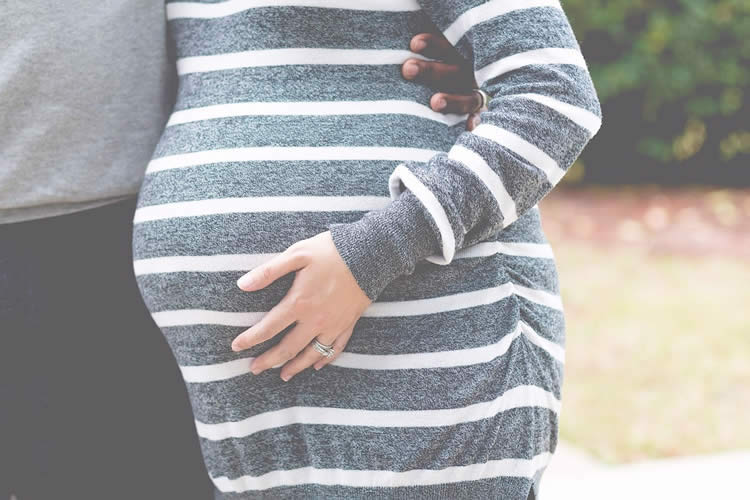Summary: A new study reports taking a probiotic during pregnancy can help to prevent or reduce postnatal depression and anxiety symptoms.
Source: University of Auckland.
Researchers from the University of Auckland and Otago have found evidence that a probiotic given in pregnancy can help prevent or treat symptoms of postnatal depression and anxiety.
The Probiotics in Pregnancy Study is a two-centre study (Wellington and Auckland) funded by the Health Research Council and Fonterra Co-operative Group Limited, which is primarily examining the effect of a probiotic on the development of infant eczema.
A secondary aim of the study was to see if this probiotic affected symptoms of depression and anxiety at 1-2 months after the baby was born. The findings were recently published in the EBioMedicine.
This component of the study was led by Professor Ed Mitchell of the University’s Faculty and Health Sciences. He says postnatal depression is associated with persistent depression, and, in a few cases each year, suicide. It can also impact on the long term wellbeing of the baby.
The study aimed to evaluate the effect of a probiotic (specifically Lactobacillus rhamnosus HN001) given in pregnancy and postpartum on symptoms of maternal depression and anxiety in the postpartum period.
Probiotics are live microorganisms that when consumed in adequate amounts provide health benefits to the host. They are typically found in some yoghurts and other fermented foods.
“Depression and anxiety in pregnancy and after birth affects 10-15 per cent of women, although many are not recognised or treated,” Professor Mitchell says.
“There is mounting evidence from animal studies that the microbiome-gut-brain axis – the biochemical signalling that takes place between the gastrointestinal tract and the central nervous system – may be important for mental health.”
The study recruited 423 women in Auckland and Wellington between December 2012 and November 2014. They were all between 14 and 16 weeks pregnant.
Of that group, 212 women were given the probiotic, and 211 a placebo. The capsules were taken daily from enrolment until the birth of their baby, and then from birth for a further six months if breastfeeding.

Mothers in the probiotic treatment group reported significantly lower depression scores and anxiety scores than those in the placebo group. Furthermore, rates of clinically relevant anxiety on screening were half that in the probiotic treated mothers.
Lead-author Dr Rebecca Slykerman of the University’s Faculty and Health Sciences says the results are significant as taking a probiotic to assist in postnatal depression is a potentially simple way to help mothers with their mental health.
“Woman are unable to access psychological therapy or are reluctant to take antidepressant medication in pregnancy or while breastfeeding. Furthermore it takes several weeks for the therapeutic effect of antidepressants to appear and there is a 15-30 per cent discontinuation rate. Safe and effective therapies to prevent and treat postnatal depression are needed.”
However, she urges caution. “The results must be replicated before recommending all pregnant women take probiotics.
Fonterra Programme Manager Nutrition Dr James Dekker says the Co-operative is encouraged by the results.
“It is pleasing to see more evidence of the health benefits of Lactobacillus rhamnosus HN001, one of Fonterra’s two probiotics. As we know not all probiotics are created equal and there needs to be sound evidence for the benefits for each probiotic strain.
While the probiotic is not commercially available through Fonterra at the moment, it can be found in the Go Healthy “Go Derma Protect” product sold in some pharmacies.”
There are many unanswered questions, including the choice of probiotic, the dose and the duration of treatment. Could probiotics be used as the primary treatment for maternal mental health problems or should they be used as an adjuvant treatment to standard therapy?
These results are of considerable interest as probiotics may be a simple, safe, cost effective and easily implemented treatment of a common and important, but often not recognised condition.
Source: Anna Kellett – University of Auckland
Publisher: Content organized by NeuroscienceNews.com.
Image Source: NeuroscienceNews.com image is in the public domain.
Original Research: Full open access research for “Effect of Lactobacillus rhamnosus HN001 in Pregnancy on Postpartum Symptoms of Depression and Anxiety: A Randomised Double-blind Placebo-controlled Trial” by R.F. Slykerman, F. Hood, K. Wickens, J.M.D. Thompson, C. Barthow, R. Murphy, J. Kang, J. Rowden, P. Stone, J. Crane, T. Stanley, P. Abels, G. Purdie, R. Maude, E.A. Mitchell’Correspondence information about the author E.A. MitchellEmail the author E.A. Mitchell, the Probiotic in Pregnancy Study Group in EBioMedicine. Published online September 15 2017 doi:10.1016/j.ebiom.2017.09.013
[cbtabs][cbtab title=”MLA”]University of Auckland “Taking Probiotics May Reduce Postnatal Depression.” NeuroscienceNews. NeuroscienceNews, 18 October 2017.
<https://neurosciencenews.com/probiotics-postnatal-depression-7757/>.[/cbtab][cbtab title=”APA”]University of Auckland (2017, October 18). Taking Probiotics May Reduce Postnatal Depression. NeuroscienceNews. Retrieved October 18, 2017 from https://neurosciencenews.com/probiotics-postnatal-depression-7757/[/cbtab][cbtab title=”Chicago”]University of Auckland “Taking Probiotics May Reduce Postnatal Depression.” https://neurosciencenews.com/probiotics-postnatal-depression-7757/ (accessed October 18, 2017).[/cbtab][/cbtabs]
Abstract
Effect of Lactobacillus rhamnosus HN001 in Pregnancy on Postpartum Symptoms of Depression and Anxiety: A Randomised Double-blind Placebo-controlled Trial
Background
Probiotics may help to prevent symptoms of anxiety and depression through several putative mechanisms.
Objective
The aim of this study was to evaluate the effect of Lactobacillus rhamnosus HN001 (HN001) given in pregnancy and postpartum on symptoms of maternal depression and anxiety in the postpartum period. This was a secondary outcome, the primary outcome being eczema in the offspring at 12 months of age.
Design, Setting, Participants
A randomised, double-blind, placebo-controlled trial of the effect of HN001 on postnatal mood was conducted in 423 women in Auckland and Wellington, New Zealand. Women were recruited at 14–16 weeks gestation.
Intervention
Women were randomised to receive either placebo or HN001 daily from enrolment until 6 months postpartum if breastfeeding.
Outcome Measures
Modified versions of the Edinburgh Postnatal Depression Scale and State Trait Anxiety Inventory were used to assess symptoms of depression and anxiety postpartum.
Trial Registration
Australia NZ Clinical Trials Registry: ACTRN12612000196842.
Findings
423 women were recruited between December 2012 and November 2014. 212 women were randomised to HN001 and 211 to placebo. 380 women (89.8%) completed the questionnaire on psychological outcomes, 193 (91.0%) in the treatment group and 187 (88.6%) in the placebo group. Mothers in the probiotic treatment group reported significantly lower depression scores (HN001 mean = 7·7 (SD = 5·4), placebo 9·0 (6·0); effect size -1·2, (95% CI -2·3, -0·1), p = 0·037) and anxiety scores (HN001 12·0 (4·0), placebo 13·0 (4·0); effect size -1·0 (-1·9, -0·2), p = 0·014) than those in the placebo group. Rates of clinically relevant anxiety on screening (score > 15) were significantly lower in the HN001 treated mothers (OR = 0·44 (0·26, 0·73), p = 0·002).
Interpretation
Women who received HN001 had significantly lower depression and anxiety scores in the postpartum period. This probiotic may be useful for the prevention or treatment of symptoms of depression and anxiety postpartum.
Funding Source
Health Research Council of New Zealand ( 11/318 ) and Fonterra Co-operative Group Ltd.
“Effect of Lactobacillus rhamnosus HN001 in Pregnancy on Postpartum Symptoms of Depression and Anxiety: A Randomised Double-blind Placebo-controlled Trial” by R.F. Slykerman, F. Hood, K. Wickens, J.M.D. Thompson, C. Barthow, R. Murphy, J. Kang, J. Rowden, P. Stone, J. Crane, T. Stanley, P. Abels, G. Purdie, R. Maude, E.A. Mitchell’Correspondence information about the author E.A. MitchellEmail the author E.A. Mitchell, the Probiotic in Pregnancy Study Group in EBioMedicine. Published online September 15 2017 doi:10.1016/j.ebiom.2017.09.013






